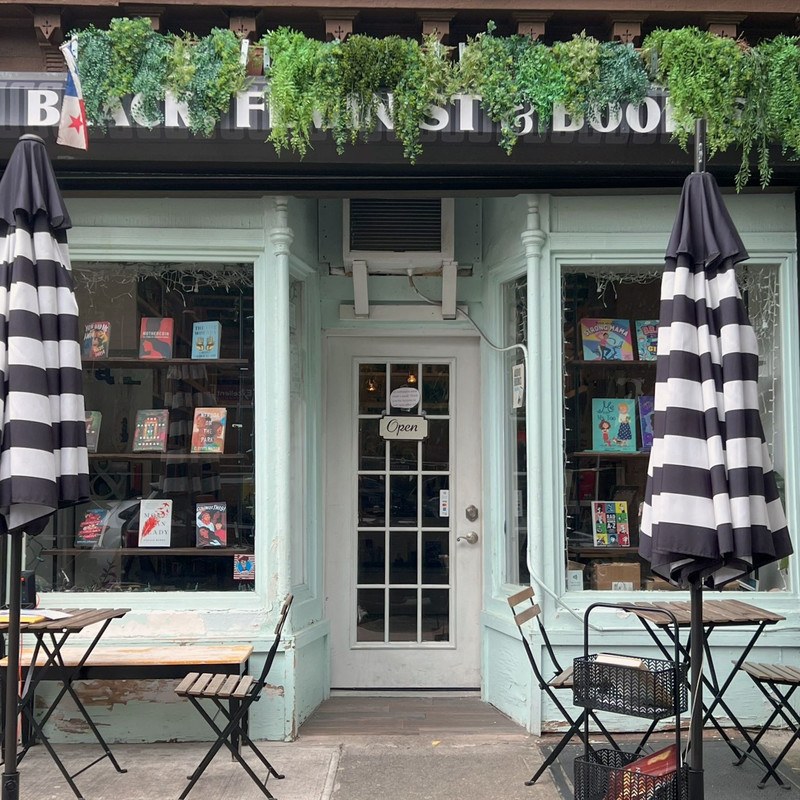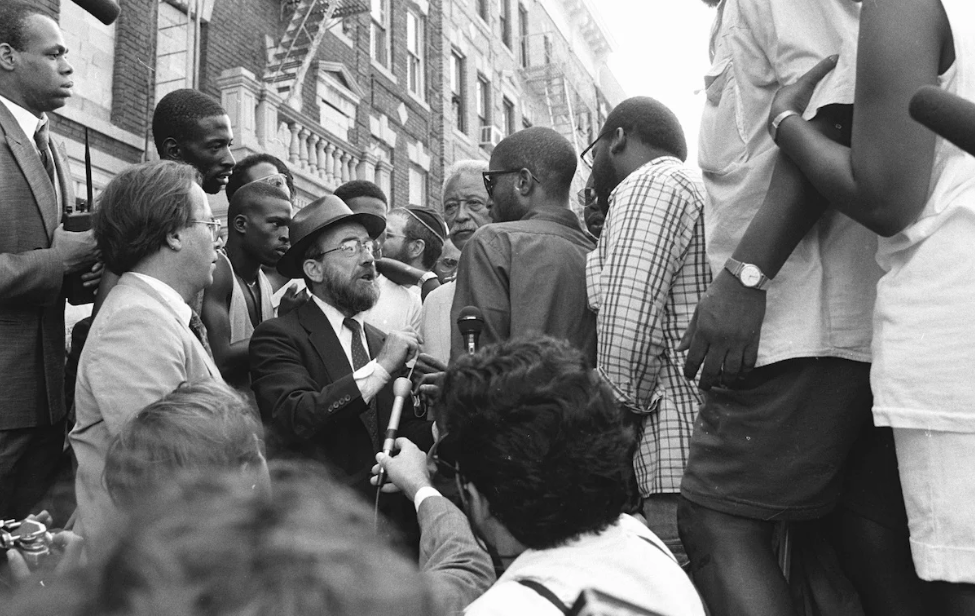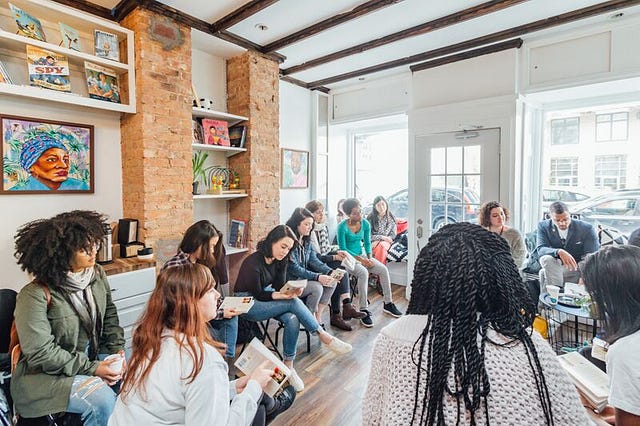Isolation in Intersectionality: How Cafe Con Libros is Breaking Boundaries in Crown Heights

On the corner of Prospect Place and Rogers Avenue sits a dog kennel, a beauty salon, a restaurant, and a small bookstore café called Café con Libros. The large windows display rows of books as they sit under the black awning that declares in bold white lettering, “Black, Feminist, & Bookish.” It is here that Kalima DeSuze began her journey of creating a feminist bookstore, while also offering a space for intersectional cooperation.
The location of Café con Libros was not chosen by chance. DeSuze had been a resident of the area, known as Crown Heights, for most of her life, living with her Panamanian immigrant parents (Giwa). The actual building of Café con Libros was also owned by a relative, Linda DeSuze, dating back to 1985 (NYC Dept.). It seemed only right for DeSuze to start this passion project in a community she had grown up in, where she knew what kind of bookstore it needed. DeSuze talks about how her goal with Café con Libros was to create a space where intersectional identities can be represented through literature (Alcantara). Intersectionality can be an isolating experience, particularly in a neighborhood such as Crown Heights, where the community is mainly Afro-Caribbean and/or Jewish (“Crown Heights”)
“I think that one of the things that I am very, very, very conscious of is the lack or the scarcity of Afro-Latina voices in larger storytelling”
Kalima DeSuze, owner of Cafe con Libros (Alcantara)
Being the daughter of Panamanian immigrants can also become isolating because of the history of Crown Heights and its demographics. The population of Afro-Caribbean and Jewish families began long before DeSuze’s parents arrived, or even before they were born. The settlement of the region began in the 1830s with two small villages founded by freed African Americans, called Weeksville and Carrville, where a large free Black population grew (Schaefer 350). When the villages were destroyed during the urbanization of the area in the late 1910s, Crown Heights became home to “an upwardly mobile, rapidly assimilating elite of Eastern European Jews and other White European immigrants” (Schaefer 350). A boom in population came in the 1940s and 1950s, when “these established residents were joined by the communities that have come to make up today’s Crown Heights: Hasidic Jews, arriving in New York as Holocaust refugees, and Black migrants, both African American and Afro-Caribbean, drawn in part by the city’s booming wartime economy” (Schaefer 350).
Crown Heights begins as a place for freed Black people in the United States, yet it turns into an intersectional neighborhood as time wears on, leading to some inevitable conflicts. On August 19, 1991, a vehicle driven by a Jewish man lost control and hit two Black children, killing one and severely injuring the other. The Black community rallied around the death of this Black child, claiming injustice regarding the medical care given to the children compared to the Jewish driver and his Jewish passengers. By the time night had fallen, an angry crowd had gathered, and at 11:25 p.m., police found the body of a Hasidic Jew stabbed on Kingston Avenue by two Black youths who had left the angry crowd looking for revenge (Chang et al.). Over the next few days, Black and Jewish protestors alike gathered to hurl insults, as well as rocks and bottles, at each other. Accusing one of racism, and the other of anti-Semitism in what would be known to history as the Crown Heights riots, which lasted until August 21.

These riots were the result of two communities, both victims of oppression, wanting justice for their friends and family. Yet this shows the difficulties that can arise when intersectionality is not embraced but resisted. When DeSuze’s Panamanian parents arrived in the United States, it was before these riots occurred, according to New York State property records, meaning they most likely saw this conflict happen in their neighborhood (NYC Dept.). The isolation that they must have felt, being not only new to the community but also Afro-Latinx immigrants, during a time when one identity was battling another. Both the Black community and the Jewish community had been mostly settled there for decades, following the immigration boom in the 40s and 50s, yet the DeSuze family sat in the middle of it all, Latinx, Black, and recent immigrants. It also feels important to note that the building that would become Café con Libros (724 Prospect Place) was still owned by relative Linda DeSuze at this time and was located just four blocks West of the street where these riots occurred.
When Kalima DeSuze decides to open Café con Libros, it’s no mystery as to why she is empowering feminist and Afro-Latina voices. DeSuze is bringing to light intersectional identities that felt unseen and unheard in literature and Crown Heights. Daphne Spain expresses the importance of diverse female stories to the feminist movement in the 1970s, stating that “Feminist bookstores sustained and enriched the women’s movement when they disseminated literature by women of differing cultures, ethnicities, races, and sexual preferences” (89). This principle is still effective in the modern day through DeSuze’s bookstore. By creating a space dedicated to uplifting the writing and experiences of women of color, she is not only enriching the feminist movement but also enriching the neighborhood by embracing intersectional identities. She is actively creating a space for people like her, who felt so isolated in a neighborhood where identities are divided cleanly from one another by a history of violence and tension.
Spain’s idea of the rebellion involved in feminist bookstores is based on the rebellion found in women reading at all. She states in her text that “a woman who could read might threaten the social order, especially if it was one that denied women access to books,” such as many religions, as well as slaves in the United States before the Civil War (Spain 89). In this light, Café con Libros is the ultimate expression of rebellion and feminism by uplifting the stories of intersectional women, most of whom would have been prohibited from reading if you go back far enough in history. The isolation of the intersectional feminist is abolished within the walls of this cozy bookshop.
DeSuze was not an experienced businesswoman when she decided to open Café con Libros. Like many owners of activist bookstores, she was involved in social change. When you take a look at her resume, DeSuze wields two social work degrees, work with domestic violence survivors, programs for female veterans, and many other projects uplifting marginalized groups (Kobert). The social activist as a bookstore owner is not a new concept, as we can see with past feminist bookstores, but also with Black bookstores during the Civil Rights movement in the U.S. Black-owned bookstores provided “spaces to a wide range of African Americans, including activist groups wishing to hold meetings and distribute their own locally produced media and flyers” (Davis 37). The boom of these bookstores was not led by people who had business degrees and were after a profitable enterprise, in fact, “most of the entrepreneurs who operated black-interest bookstores…had extensive backgrounds in leftist and black nationalist politics” (Davis 38). DeSuze is enriching the feminist movement as well as the antiracist movement with her little bookstore and café, simply by existing in this neighborhood full of intersectional individuals. By combining the activism of the feminist bookstore and the Black bookstore, she is bringing together a community of individuals who may not have had a community before.

After the initial opening of Café con Libros, DeSuze continued to expand her website and community impact through book clubs, blogs, and podcasts. January 16, 2018, shortly after the grand opening, the Feminist Book Club began having meetings via Zoom (“Intersectional”). This book club is currently listed as being on hiatus for 2023, but DeSuze continues to host a Womxn of Color book club on the fourth Sunday of every month. Outside of this DeSuze also has a podcast featured on the Café con Libros website titled “Leyendo la Diaspora,” or “Reading the Diaspora” in English. In this podcast, DeSuze works with Johanna Burgos to discuss the works written by members of the “Latinx diaspora” (“Intersectional”). And yet, there’s more. DeSuze also features a blog on the website called “Pages,” where she writes about social issues that are important to her such as Asian Hate, mental illness, and the murder of Breonna Taylor. All of these elements work together to create what DeSuze wants; a place where everyone can come and be heard. She is reaching feminists and women of color across the country through her blog and podcast, bringing together those who once felt isolated and making her bookstore a community-focused space.
Here we can see the history of DeSuze and her outreach to the community through Cafe Con Libros
DeSuze brings new meaning to old principles with Café con Libros by combining the activism of Black bookstores from the Civil Rights era with the intersectionality of the feminist bookstores of the 1970s, tying it all together with her personal experiences and struggles. It is because of DeSuze and the principles she stands for with Café con Libros that I cannot imagine this lovely little shop being located anywhere else. It embraces the intersectionality that provoked riots over 30 years ago, creating a space for those who feel isolated within their identity. No one social movement can be isolated from others; by uplifting the antiracist movement we must also uplift the feminist movement, and vice versa. Kalima DeSuze is working hard to bring this idea to Crown Heights, and by doing so working to heal the wounds that remain from riots and accusations of the past.
Sources:
Information/History
Alcantara, Amanda. “Meet the Owner of Café Con Libros, a Feminist Bookstore in Brooklyn.” BESE, 4 Mar. 2018, www.bese.com/meet-the-owner-of-cafe-con-librosa-feminist-bookstore-in-brooklyn/#:~:text=It%20sits%20next%20to%20a,itself%20as%20feminist%20could%20thrive.
Chang, Dean, et al. “Fatal Crash Sparks Crown Heights Riots in 1991.” New York Daily News, New York Daily News, 21 Apr. 1991, www.nydailynews.com/2016/08/18/fatal-crash-sparks-crown-heights-riots-in-1991/.
“Crown Heights/Prospect Heights Neighborhood Profile.” NYU Furman Center, furmancenter.org/neighborhoods/view/crown-heights-prospect-heights. Accessed 18 Sept. 2023.
Davis, Joshua C. “Liberation Through Literacy.” From Head Shops to Whole Foods: The Rise and Fall of Activist Entrepreneurs, Colombia University Press, 2017, pp. 35-82.
Giwa, Cynthia. “Cafe Con Libros.” Black-Owned Brooklyn, 1 Mar. 2018, www.blackownedbrooklyn.com/stories/cafe-con-libros.
“Intersectional Feminist Bookstore: Cafe Con Libros: New York.” Cafe Con Libros, www.cafeconlibrosbk.com/. Accessed 4 Oct. 2023.
Kobert, Rebecca. “Badass Women: Kalima DeSuze, founder of feminist bookstore, Café con Libros.” Medium, 28 Jun. 2018. https://medium.com/coconuts/badass-women-kalima-desuze-founder-of-feminist-bookstore-cafe-con-libros-c64e0f8ed358.
NYC Department of Finance, Office of the City Register. Deed to 724 Prospect Place. Automated City Register Information System, 5 December 1985, https://a836-acris.nyc.gov/DS/DocumentSearch/DocumentDetail?doc_id=FT_3010009032901.
NYC Department of Finance, Office of the City Register. Deed to 724 Prospect Place. Automated City Register Information System, 7 November 2007, https://a836-acris.nyc.gov/DS/DocumentSearch/DocumentImageView?doc_id=2007103000371001.
Schaefer, Richard T. Encyclopedia of Race, Ethnicity, and Society. SAGE, 2008.
Spain, Daphne. “Feminist Bookstores: Building Identity.” Constructive Feminism: Women’s Spaces and Women’s Rights in the American City, Cornell University Press, 2016, pp. 84-110.
Images
An argument between a Hasidic Jew and a black man. “The Alliance Between America’s Black and Jewish Activists Has Long Been Troubled” by Arica Coleman, 22 Aug. 2016. TIME, https://time.com/4460730/crown-heights-anniversary-blm-platform/.
Exterior of Café con Libros. “Café con Libros” 23 Jun. 2023. Poets & Writers, https://www.pw.org/literary_places/cafe_con_libros.
Setter, Chris. Book club meeting. “Badass Women: Kalima DeSuze, founder of feminist bookstore, Cafe con Libros” by Rebecca Kobert, 28 Jun. 2018. Medium, https://medium.com/coconuts/badass-women-kalima-desuze-founder-of-feminist-bookstore-cafe-con-libros-c64e0f8ed358.
Timeline
Timeline made by Megan DeAngelo using Time.graphics.

0 Comments